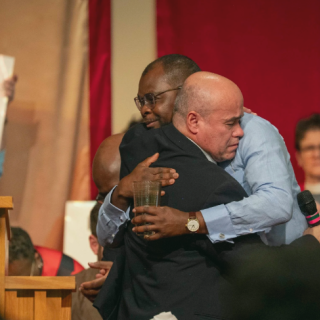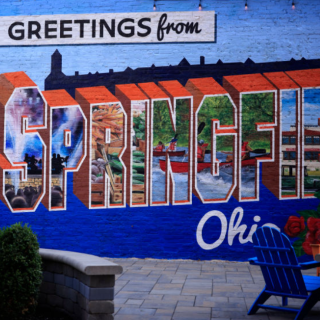Advertisement
While modern warfare may consist of a hefty dose of drone strikes and off-site technology, it doesn’t change the fact that post-traumatic stress disorder has been and continues to be a genuine threat to veterans returning from the battlefield.
Many solutions to PTSD involve medical treatment. However, over time an interesting element has crept back into the treatment conversation: the fact that people with PTSD are human beings. PTSD is a profound mental struggle that can’t simply be “turned off” with a pill. It’s a challenge that requires a complicated response, something that music is uniquely equipped to deliver.
Veterans in the U.S.According to the University of Nevada, Reno, there are nearly 20 million veterans in the United States. That’s a significant portion of a population that, as of 2016, consisted of around 330 million people. To put it another way, on average, just over one in every 16 people you meet is a veteran.
Not only that, but nearly one out of every five of those veterans has a service-connected disability. However, while many of these wounded warriors have made incredible sacrifices while on the job, often the profound struggles hiding behind their kind smiles can be just as dangerous as physical ailments.
Those inner struggles should be addressed, before they lead to more serious, often life-threatening issues down the road.
Ways to Help Veterans Reintegrate into Civilian LifeThere are many resources that veterans can use to help them through the challenges of reintegrating into civilian life. Some of these are provided via professional organizations, such as finding a job, securing housing loans, and other quality of life aids.
However, aiding our returning military in their re-entry into everyday life isn’t something reserved for professional organizations. There are also a multitude of ways that civilians can get in on the action and tip their hats to the vets around them.
One obvious way to show your support is to volunteer at local organizations focused on providing support to veterans in your area. Other options include something as simple as flying an American flag, writing thank-you letters, teaching our children about the sacrifices veterans have made and demonstrating how to honor them. There are even organizations that can take donated cell phones and use them to help keep soldiers in touch with their families.
However, at the end of the day, if every house flew a flag and every soldier had a cell phone, it wouldn’t change the fact that PTSD is and continues to be one of the most difficult hurdles to overcome in the day to day post-service walk.
That’s where music comes into play.
Music Therapy for VeteransThere are multiple ways that music therapy can help in the fight against PTSD. In some cases, musicians are able to volunteer their skills, while in others it’s the vets themselves that pick up that guitar or sit down at a piano to receive some musically inspired healing.
Here are some of the ways that music is making an impact in the veteran world.
Avoiding That MedicineThere’s no doubt that medicine is important. It literally saves lives every day. But there’s a point where it can be overly prescribed.
If medicine becomes the answer to every struggle in our lives, chances are it’s not going to have the desired effect. This is especially true for vets who are dealing with the incredibly complex issue of PTSD. The struggle to process the difficult experiences that come with a career in the military is difficult to fathom, and typically require more than a pill bottle.
That’s why multiple programs have been and are being developed to break from the medical solutions and look for more gentle, effective options (like music!) as tools in the battle against depression, anxiety, self-harm, and the countless other side effects that PTSD can have on the lives of those scarred by their military experiences. The best part is that these programs are being acknowledged more and more, even by doctors and organizations that initially may have been more skeptical.
Why the change in attitude? Because music works. It’s as simple as that. Not that that’s news to anyone familiar with the craft.
The Emotional Struggle: Letting Veterans Make the MusicGroups like Warrior Songs help veterans to “channel the flood of emotions” that can follow a life spent in the trenches. The organization, founded by war vet Jason Moon, uses art to help veterans express the struggles that they face through PTSD.
One of the key expressions that the organization utilizes is music. Composing both music and its accompanying lyrics can be an incredible way to face fears, challenges, and struggles head-on. Rather than stuffing down and avoiding these feelings and struggles, it allows veterans to find their voice, helping them express what they might otherwise fail to find the words to utter.
The benefits of this are numerous. Not only does it bring relief, but it can also help foster new hope born out of devastation, loss, and depression. It also allows veterans to communicate with their loved ones through a medium that both parties can understand and relate to.
Other benefits can be more subtle, and yet completely life-changing, such as an assuaging of the desire to drink the pain away. For example, 10-year Air Force veteran Peggy Ullom participated in a veterans group that met on Bellevue University campus regularly to play music. The cathartic experience has been revolutionary, with Ullom even reporting "Just random thing(s) people will say like, 'I haven't had a drink since I picked up a guitar.' Wow. That changes lives.”
Serving Those Who Served: Bringing the Music to Our VeteransThe Veterans Administration is constantly under strain. Even with tens of thousands of volunteers, Regis College reported that over one-third of VA patients had to wait over a month for an appointment. The issues with veterans’ hospitals are being addressed, but while things like wait times and quality of care are improving, music has also made its own, unsung impact on those veterans spending time in VA facilities.
Musicians, especially those of the music therapy profession, are taking their skills right into veterans hospitals and using it to serve those who are actively suffering. While there’s something special about the power of personally creating one’s own music, it doesn’t negate the fact that even the simple act of hearing a live performance can alleviate fears, bring peace, and restore hope in ways that proponents of modern medicine will never fully understand.
Doing MoreWhile we already touched on different ways to get involved in supporting our veterans, one excellent option that combines volunteering with the powers of music is to look for a local organization that provides music therapy to vets in your area. If you can’t find an organization, try to set up something with your local veterans’ hospital yourself!
If you’re a talented musician, it really is worth consideration to take your talents into the nearest VA facility. The impact of a musically-infused visit goes beyond simply using the music itself for healing. It also shows that you also are willing to go above and beyond in order to bring that healing right to them as they rehabilitate. It’s a minor sacrifice of love for those who have given their all to keep us safe and sound.



